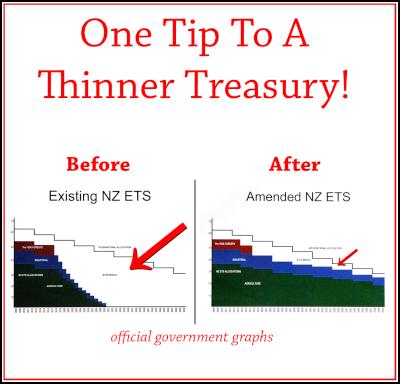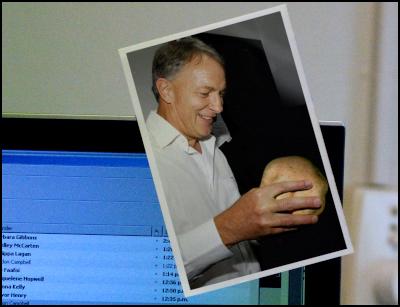Lyndon Hood - also ends in *itter, Wellington
Wednesday, November 25, 2009
And, in some blog-only content, I can announce that I am not in fact this Lyndon:
... though that does not exclude the possibility that I am, irrespective, wicked.
Lyndon Hood - bitter emitter
Sunday, November 22, 2009
In the end I believe I put 'journalist', which now I think about it is probably ironic enough to fit the bill. I don't produce a whole lot of news, either.
I do work for the media. So you'd think I'd know better (and that I might not say so) but recent events have impressed me upon me the general media's ability to get things exactly wrong.
About this hundred billion dollars.
Now, I am not an expert. The fact that my most recent piece on the ETS went up the day before the unfairness in the ETS was all over the front of the Herald( Brain Fallow , BTW, is an example of someone excluded from allegations of not-knowing-what-he's-talking-about) was not due to planning, except in so far as I timed it for a lull in the Harawira saga.
Nor do I claim any particular magic in the way that column was about a certain hundred billion dollars, several days before the Treasury advice came out. A calculation on that order had, for example, already been mentioned in Parliament. Though something else put it at the front of my mind. If you're keen, you'll probably be able to work out what.
However, it does mean that one thing I do know is what that figure represents.
(Actually, I could be wrong, since I know little else. But the best sources are consistent with my belief. Feel free to correct me.)
It is not the revised 'cost of fighting climate change'. Or the ETS. It is not the cost to the economy of anything.
It's certainly not New Zealand's Kyoto obligation. Nick Smith actually argues we are currently in credit, though there would seem to be creative accounting involved. I considered it a clue when we went from a billion-odd dollars in Kyoto deficit to a small credit now there's a new Government, and Smith claimed this was due to forests planted in the 90s.
The economic George has probably has an impact. But at current prices Fallow says our Kyoto obligation will be of the order of two billion dollars, and no country currently has any obligations after 2012.
But you could be forgiven for thinking the hundred bil. was one of those things if you read the headlines, listened to the teasers, or, indeed, read some of the articles.
What the hundred billion is, is an estimate of the fiscal impact of National's changes to the ETS, taken through to 2050. It's the effect on the Government books, as compared to Labour's ETS – which what we currently have.
An impact that's about double what they were saying it would be.
As I said
That’s one hundred billion dollars less incentive for the economy to reduce carbon emissions, and one hundred billion dollars less money for tax cuts, hip operations, trips to Hawaii, buying Kyoto credits and so on.
Of course, it's also one hundred billion dollars less price rises in carbon-intensive stuff. All other things being equal, it's shifting the cost from the consumer to the taxpayer (but the whole idea of an ETS is for all other things to not be equal).
The whole idea of an ETS is to put a market-driven price on carbon. A hundred billons less of that and all.
This is making the ETS a hundred billion dollars smaller, and all those billions are for the emitting side of the ledger.
That's estimated, with a number of variables like carbon price unknown, and subject to future review of the regime. But you'd think a Government would try to get it as right as they could the first time rather than dismissing the issue.
The changes in question are the amount of free emission credits, particularly for industry and agriculture. The phase-out of free credits would be much slower, there's some kind of two-for-one deal, there's a cap on the (local ETS's) price of carbon and the scheme becomes intensity-based – so it's not actually about how much you emit, but how efficient you are. I can see that asdding up rather quickly.
I'm not saying it's exactly straightforward. There were two other people in hearing range of my half of the discussion when I talked to bFM about this, and I subsequently had to explain it again to them both.
Anyhow, let's all get that one thing right from now on.
If you're still having trouble you might check the various ways I said it to PC. I would have thought taking one hundred billion dollars less of a tax raised in the name of a cause he doesn't believe in, might have been something he would be broadly in favour of, so I kept trying. [Looking for that link on PC, I see the emails thing. I only have one point here and it's not about that. I haven't looked into it but I suspect if the story really was that big then the money quotes found in years of emails would be better.]
A few other thoughts:
Irrespective of whether the ETS makes a profit for the Government of not – and whether you call it a 'subsidy' or 'foregone income' – all that money comes off the national Treasury's bottom line and onto the national debt.
It was apparently estimated the Labour scheme as a whole would make a profit for the Government. National said they are aiming for the ETS as a whole to be fiscally neutral. So if their calculations were really out by fifty billion, that would put the taxpayer about 50 billion in hock for having the ETS at all. I think that definitely is a subisdy, and not just 'forgone income'.
Also: Isn't the ETS huge, that you can fiddle with a couple of sectors and produce numbers that are a decent chunk of the GDP?
And: I haven't checked, but to be fair to Treasury I think they are correcting the Ministry for the Environment's estimates and not their own. So it's a whoopsie for the Government, but not Treasury. The fact the Select Committee got this advice of the Friday and reported on the Monday is apparently more a product the Government's haste than anything else.
(The say they want it in place for Copenhagen – but we have an ETS that's rather more likely to impress people as it is. They want their changes in place before the start of next year, when the current one that nobody's been preparing for is still due to come into force.)
Extra for experts: Keep an eye out for people assuming cuts to free emissions credits are the same as emissions cuts. Such as for example when Nick Smith says their free credit phase-out is consistent with a -50% by 2050 emissions target.
Labels: emission trading scheme, having the faintest idea, media, Nick Smith, nz politics, Treasury
Lyndon Hood - Lapsed Shylock, Wellington
Wednesday, November 18, 2009
Getting things right for farmers and New Zealand
“I am a farmer. Hath not a farmer eyes?
Hath not a farmer hands, organs, dimensions, senses, affections, passions? Fed with the same food, hurt with the same weapons, subject to the same diseases, healed by the same means, warmed and cooled by the same winter and summer as townies?
If you prick us, do we not bleed? If you tickle us, do we not laugh? If you poison us, do we not die?”
Which, as we all know, continues...
… and if you wrong us, shall we not revenge? If we are like you in the rest, we will resemble you in that.
If a Jew wrong a Christian, what is his humility? Revenge! If a Christian wrong a Jew, what should his sufferance be by Christian example? Why, revenge!
The villainy you teach me I will execute, and it shall go hard but I will better the instruction.
Charming.
Labels: federated farmers, quotation abuse, shakespeare
Submission On ETS Amendment Bill
Wednesday, November 11, 2009
I wish to make a submission on the Climate Change Response (Moderated Emissions Trading) Amendment Bill. Official submissions have closed, but that’s all right, as I mean to to publish my mine here, where someone who cares might read it.
I OPPOSE the Climate Change Response (Moderated Emissions Trading) Amendment Bill.
1. While its purpose is laudable, I believe the mechanism is inappropriate.
2. The most notable change brought about by this bill would be giving polluters, to 2050, one hundred billion dollars ($100 000 000 000), money which under the scheme as it stands would go to the Government. (See figure 1.)
3. That’s one hundred billion dollars less incentive for the economy to reduce carbon emissions, and one hundred billion dollars less money for tax cuts, hip operations, trips to Hawaii, buying Kyoto credits and so on.
4. As I say, I am right behind that idea, but the proposed system for delivering the money is unnecessarily complicated.

Click to enlarge
[figure 1]
5. Since, under the proposed intensity-based system, polluters will be able to gain credits by reducing emissions and by increasing them – why not just hand these industries a great big cheque?
6. In these difficult times, with the government fighting a “decade of deficits” and wondering how to pay for ACC, I think the nation would be cheered by the spectacle of Nick Smith handing polluters a giant novelty cheque for one hundred billion dollars.
7. A giant novelty cheque made of coal.
8. No no no – made of diamonds.
9. By the way, I apologise if I’ve said anything racist. Apparently I’ve got no idea what counts as racism. Judging by what everyone else says, I tend to mistake it for someone’s self-serving justification of their own sense of entitlement. Which is, in itself, less despicable and – perhaps even among politicians – more common.
10. Also, if a reporter can’t tell the difference between a simple declaration and a rhetorical exaggeration wrapped in a conditional statement, they should be shot.
11. Where was I?
12. I may be mistaken about the purpose of this bill. It might be that it is not designed to hand vast amounts of cash to industry.
13. Perhaps it is done out of enthusiasm of global warming. Or the National Party’s much-voiced antipathy to Government surpluses.
14. If the second option is the case, I suggest we should pour the money into a hole in the ground.
15. As well as minimising transaction costs, this would sequester the carbon content of five billion (5 000 000 000) twenty dollar notes.
16. I release that may be of little – even entirely rhetorical – benefit to net New Zealand carbon emissions. But even that much would be an improvement on the current bill.
17. I do not wish to speak to my motherf*****g submission.
Labels: climate change, emission trading scheme, hone harawira, legislation, nz politics, rodney hide, satire
Lyndon Hood - vs vampires, Wellington
Wednesday, November 04, 2009

Werewolf V is here.
I wrote a thing for it. It is not all entirely true.
I’m not a great one for keeping commitments made on this blog, but I think I can improve on one column every two months. I don’t think it was just me; is it something in the air? I took to saying they seemed daft enough at the moment without me pointing it out.
Also, it’s been busy at the office. I have done a bit of work in the humour line which may possibly see the light of day at some point.
Anyhow, speaking of press releases, in the meantime I saw In The Loop at the cinema and managed to catch Live At Six at Bats. (Incidentally, I have never been on the Bats waiting list and failed to get in.)
These are interestingly parallel and basically realistic condemnations of the state of mass-consumer politics and media respectively. It’s probably historical utopianism, but those institutions seem to have done for debate the same thing supermarkets did for food.
They also both featured a terrifyingly capable amoral PR fixer, a type which now I think about it is a satire almost by itself. Though In The Loop also made a point of being cruel to him, which was nice.
Another thing they had in common was they made Lyndon feel inadequate.
Note to self: write more stuff.
Arts Festival looks good, by the way (I refer to the programme rather than the visual identity). And I'm not just saying that because of all their wine I drunk at the launch. We will be soliciting reviewers in due course...

Click to enlarge
Labels: human rights, in the loop, legislation, live at six, nz politics, press releases, satire, wellington international arts festival, werewolf

